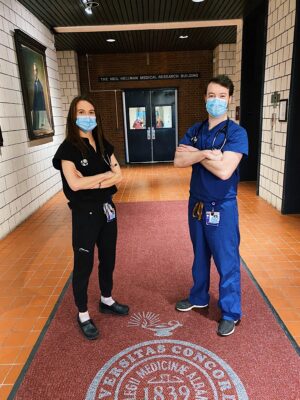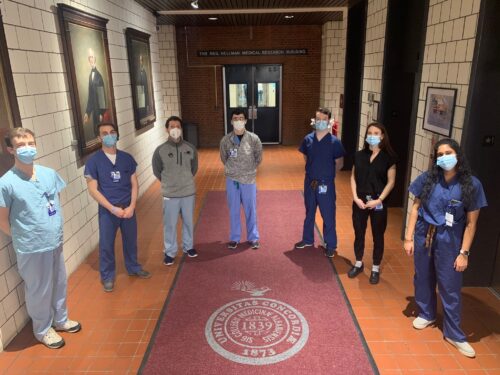When we “move up” from elementary school to middle school, we are asked what we want to be when we grow up. The responses range from professional sports players, zookeeper, chef, singer, etc. And when we graduate high school, we normally have a better idea in our head of what life will look like five years down the road. For two Greeley grads, their fourth grade career goals and five year plans definitely did not include being essential workers in a hospital during a time of a national pandemic, but life throws curve balls at us like that sometimes.

Allison Schachter and Peter Inglis are both Greeley grads (2013 and 2010 respectively) and are current medical students at Albany Medical College in upstate New York. While Schachter always had the intention of becoming a doctor, Inglis went to undergrad initially for engineering and later switched into a pre-med program.
At the beginning of the pandemic, the hospital began to limit the amount of medical students who could scrub into the OR, due to the fact that the PPE, or Personal Protective Equipment was needed elsewhere. Shortly after, both students were sent an email stating that they would no longer be able to return to the hospital for rounds, to collect their things and to go home. This was not only disheartening but raised concern for it was almost time for the students to apply and declare what they wanted to specialize in – how were they supposed to truly know what they wanted to do for the rest of their lives if they wouldn’t have the final chances to try it out?
That’s where the Compassion Coalition comes into play. It was started by Dr. Jackcy Jacob, one of the hospitalists in Albany, and further continued by a group of eight student volunteers, such as Schachter and Inglis, with more students now signing on. It satisfies the need to connect patients with their families outside of the hospital and make those outside feel less helpless by connecting them via iPads. And even though the students weren’t technically allowed in the hospital for their rounds, they could still volunteer to do this.
“We are filling a need that isn’t being fulfilled in the hospital. That’s what kind of made it allowed, is that we are of need, like an essential worker if you want to call it that,” Schachter said.
As time has gone on, they have been able to recruit more and more students to join.
“I think what’s unique about this group specifically is that…we don’t get grades for it, we don’t get extra credit for it…everyone sort of took their own initiative to do it,” Inglis added.
So, how does it work?

Between the day shifts and the night shifts, there is essentially a list that gets passed on, containing information such as patient credentials, family members who want to be contacted, call time preference and frequency of the calls.
The volunteers, like Schachter and Inglis are not allowed to go into the patient’s room to prevent spread of the disease and outside contact. Their job is to essentially set up the call.
Schachter explains: “When that nurse is putting on their PPE to go into the room, that’s when we coordinate the calls. So we’ll grab the iPad, call the family, have them on Facetime, so we’re the ones who start the conversation.”
And don’t worry, the iPads have their own set of PPE gear (more like a tight plastic bag) that they “wear” before going into the rooms too. Once the nurses and the iPads have their gear on, that is when they can enter the room to conduct the calls.
These calls are available for all patients, regardless of their condition, it’s just up to the family members.
“Often time in the ICU, the patients are intubated, which means they are not really communicative…Usually we encourage families to nonetheless say what they want to say, having the videochat portion of it definitely gives them a chance to see the patient, which is nice,” Schachter said.
For those who do wish to still have the call, they will just spend the time talking to their loved one. One family even performed a concert for their family member that went on for three hours! Now that, that is love.
Thankfully, they haven’t seen any shortages of the iPads themselves. They were actually part of a big donation. If anything, it’s the stands that they place them on.
In terms of what Schachter and Inglis would want people to know about COVID-19? It is affecting more age groups than you would think, and perfectly healthy people can be fine one day and pass away the next.
Their main takeaway is that social distancing is extremely important, and that some people are looking at this as if they are part of a demographic that is untouchable.
“People are approaching social distancing not very altruistically…The reality of social distancing isn’t to look out for #1, to lookout for #2, right? Because you as an asymptomatic carrier have the potential to make somebody else who is vulnerable to the virus very very sick,” Inglis explained.
While the Compassion Coalition helps serve the patients, it’s arguably more about the family members who not only can’t be with them to help care for them, but sometimes don’t even know where they are due to the fact that so many patients have been transferred all over the state.
“Most of our patients that we are treating in Albany are not from Albany County. They have been transferred to us from NYC, from Queens, that region because that’s the part of New York that’s been hit hardest by the virus…by us having the ability to settle their ease to show them that their family member is in fact really good care…as they’re on the phone with us they see their surroundings and they can experience how much care we are giving to their family members,” Schachter said.
She also said this which encompasses the entire initiative:
“Families really need to be involved in their loved one’s care. It’s so important to how humanity functions.”


